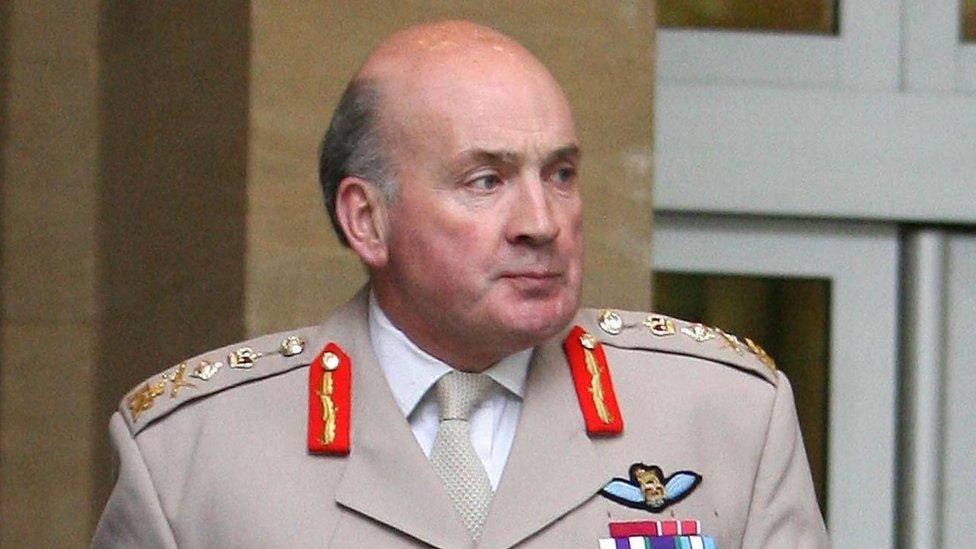NI parties hit out at veteran prosecution pledge
- Published
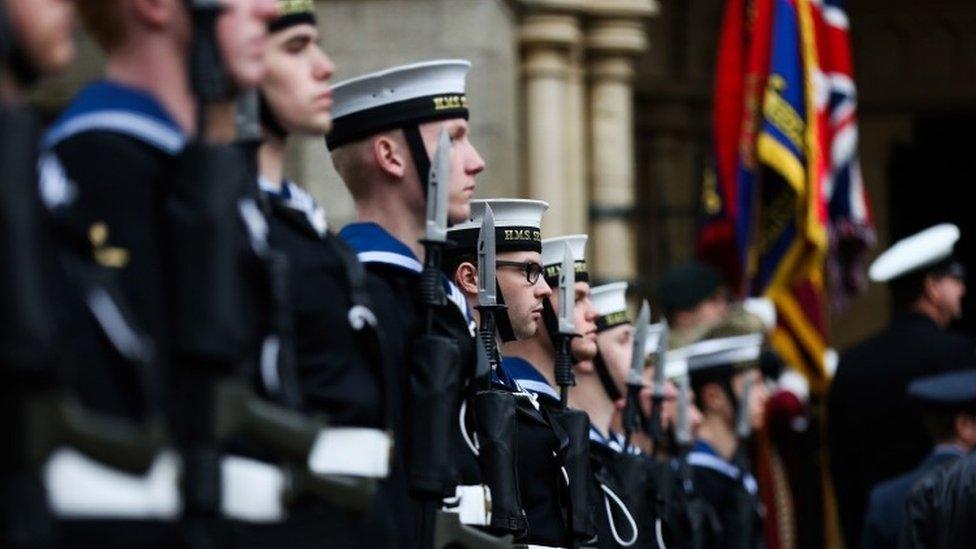
A row has broken out over a Conservative Party pledge to protect NI veterans from prosecution.
The Tories marked Armistice Day by promising to change the law to protect those who served in NI.
But Ulster Unionist, Sinn Féin and Alliance politicians criticised the proposals.
The DUP called for more detail about what the government intended and the Tánaiste (Irish deputy prime minister) said it was "deeply concerning".
UUP MLA Doug Beattie dismissed it as a pledge to attract votes and said he would not support it.
Sinn Féin's Linda Dillon called the promise "unacceptable".
DUP chief whip Sir Jeffrey Donaldson said his party supported veterans but would like to see the proposals in more detail.
The Alliance Party's Stephen Farry said there must be no amnesty for anyone who broke the law.
Under the proposals, the Conservative Party would amend the Human Rights Act so it does not apply to issues - including deaths during the Troubles in Northern Ireland - that took place before it came into force in 2000.
In a tweet, Tánaiste Simon Coveney said that the UK and Irish governments had agreed an approach on legacy and reconciliation in Northern Ireland.
"There is no statute of limitations, no amnesty for anyone who committed crimes in NI," he said.
"The law must apply to all, without exception, to achieve reconciliation."
'More complex'
The BBC's assistant political editor, Norman Smith, said the move would not stop all claims, as there were other routes to bring other prosecutions.
He added that amending the Human Rights Act is "probably a good deal more complex that it looks at first sight" as it is enshrined in the Good Friday Agreement.
The pledge comes as six former soldiers who served in Northern Ireland during the Troubles are facing prosecution.
The cases relate to the killings of two people on Bloody Sunday in Londonderry in January 1972; as well as the deaths in separate incidents of Daniel Hegarty, John Pat Cunningham; Joe McCann and Aidan McAnespie. Not all of the charges are for murder.
The Public Prosecution Service (PPS) has said that of 32 legacy cases it has taken decisions on since 2012, 17 related to republicans, eight to loyalists and five are connected to the Army.

Victims being treated like 'political football'
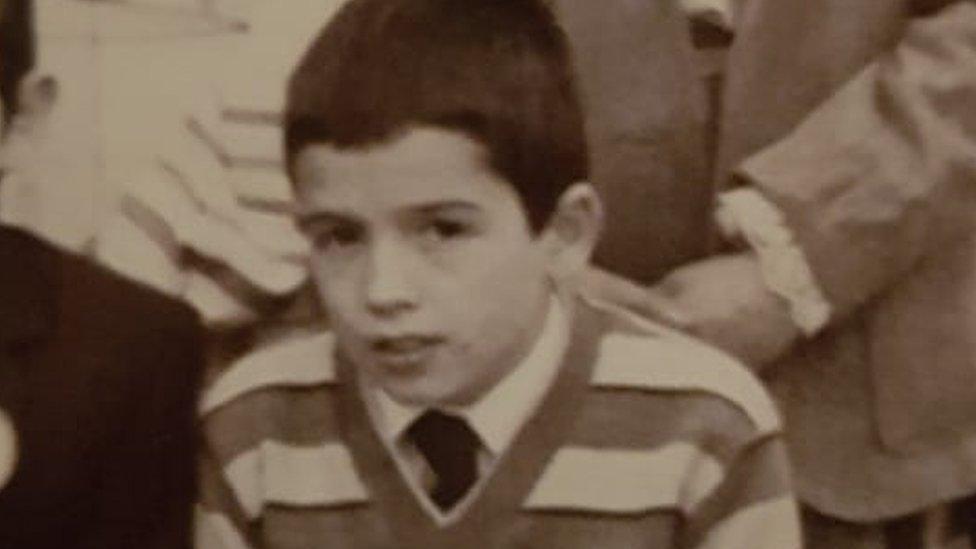
Stephen McConomy was killed in 1982
The brother of a Londonderry schoolboy killed by a plastic bullet fired by a soldier 37 years ago has said politicians are using victims as a "political football".
Eleven-year-old Stephen McConomy was playing with friends in the Bogside area of the city in April 1982 when he was shot in the head.
The soldier claimed he fired the shot by accident and was never prosecuted.
Stephen's brother, Emmett, said there should not be any kind of "amnesty for anyone involved in the conflict in Northern Ireland.
He added:" A crime is a crime, whether that is perpetrated by citizens or by the state, they should face the full rigours of the law."
Mr McConomy said families like his are being "strung along and used as a political football for votes".

Defence Secretary Ben Wallace told BBC Radio 4's Today programme that any changes would not affect current criminal prosecutions brought against service personnel, but in future, those who wanted to pursue complaints against the forces would have to go to the European Court of Human Rights rather than UK courts.
"At the moment, because of the Human Rights Act, people can go via our courts and use our systems to constantly reopen this and we don't think that is right or fair," he said.
Mr Beattie, who is a retired Army captain, told BBC News NI's Good Morning Ulster programme that "what they are proposing is to draw a line under all prosecutions".
"That means that the terrorists who terrorised our communities, who murdered and butchered men, women and children will get away scot-free and brag about what they did," he said.
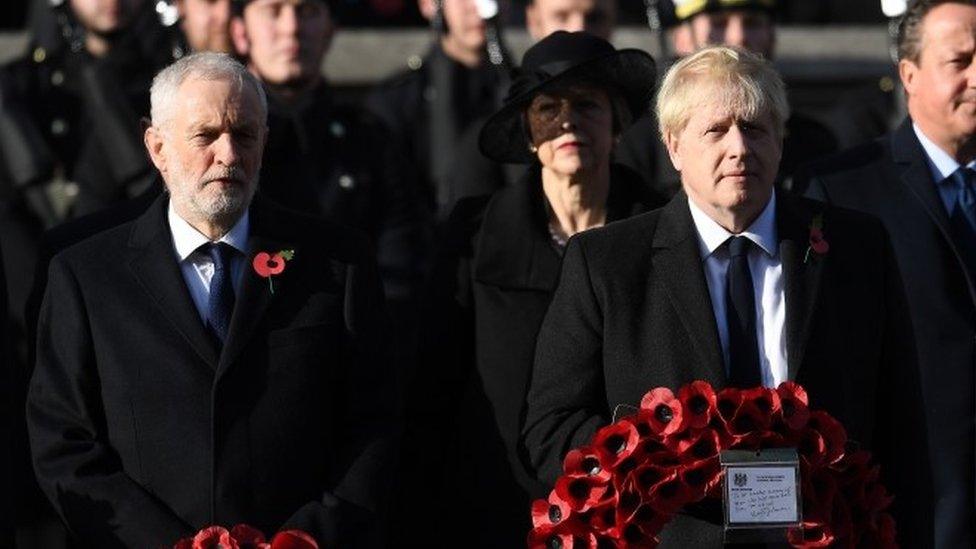
Sir Jeffrey said the DUP "fully supports our soldiers and veterans".
He added that while the party want to see more "legal protection for our armed forces", it also wants to see the proposal in more detail.
"We will not support any legislative change which helps terrorists escape justice."
Mrs Dillon, a Sinn Féin MLA, said: "Any attempt to create a scenario where current or former British soldiers are given immunity from prosecution on top of the impunity they have enjoyed for decades is unacceptable.
"Mechanisms have been agreed by the two governments and political parties at Stormont House to deal with the legacy of the conflict and those most be implemented and put in place."
Mr Farry of the Alliance Party said there must be no amnesty for anyone who has broken the law.
"Under the Good Friday Agreement, the sentence may be curtailed, but justice should be done in court".
He added: "Victims deserve due process at the very least."

Analysis: Detail of pledge could lead to further criticism
By Jayne McCormack, BBC News NI political reporter
This is not the first time the Conservative Party has made such a pledge.
As recently as July, during the leadership race, Boris Johnson vowed to change the law - aware it's an issue that has put internal pressure on a number of Tory leaders.
But the government was criticised when no such legislation was included in the Queen's Speech in October.
That is why some are saying this fresh commitment is merely a vote-grabber, albeit including it in a party manifesto puts more of an onus on a government to follow through.
What is less clear is the detail of all this.
How would such a proposal work alongside current law? Who would it apply to? What impact would the move have in Northern Ireland, where legacy remains divisive and unresolved?

It is the first time since 1923 that Armistice Day - commemorating the end of World War One - has fallen during a general election campaign.
Speaking during a trip to the midlands to meet forces personnel, Prime Minister Boris Johnson said: "We now think this is a good way forward to protect armed forces personnel from vexatious cases pre-2000 when there's no new evidence.
"People do feel there's been a basic unfairness when there hasn't been new evidence - and so this is a good way of protecting our armed services."
Mr Johnson has pledged to change the law if the Conservatives win a majority in the election.
Labour leader Jeremy Corbyn said: "After a decade of government cuts and outsourcing, Labour offers our armed forces real change with the pay, conditions and respect they deserve."
Conservative plans to exempt British troops from human rights laws during combat were first announced in 2016 by Mr Johnson's predecessor as prime minister, Theresa May, but they have yet to be put into law.
- Published12 July 2019
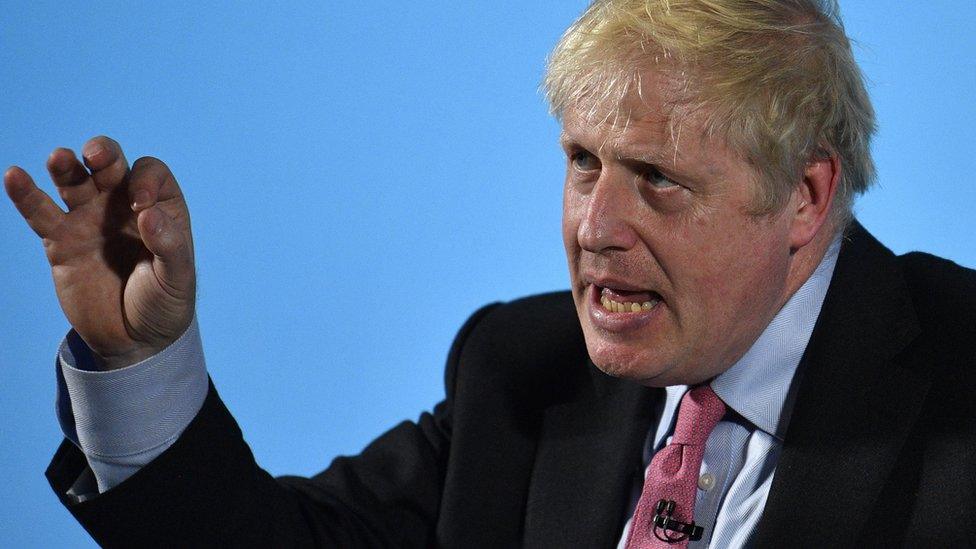
- Published13 October 2019
